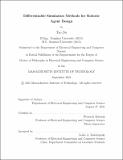Differentiable Simulation Methods for Robotic Agent Design
Author(s)
Du, Tao
DownloadThesis PDF (48.94Mb)
Advisor
Matusik, Wojciech
Terms of use
Metadata
Show full item recordAbstract
Designing robots with extreme performance in a given task has long been an exciting research problem drawing attention from researchers in robotics, graphics, and artificial intelligence. As a robot is a combination of its hardware and software, an optimal robot requires both an excellent implementation of its hardware (e.g., morphological, topological, and geometrical designs) and an outstanding design of its software (e.g., perception, planning, and control algorithms). While we have seen promising breakthroughs for automating a robot's software design with the surge of deep learning in the past decade, exploration of optimal hardware design is much less automated and is still mainly driven by human experts, a process that is both labor-intensive and error-prone. Furthermore, experts typically optimize a robot's hardware and software separately, which may miss optimal designs that can only be revealed by optimizing its hardware and software simultaneously.
This thesis argues that it is time to rethink robot design as a holistic process where a robot's body and brain should be co-optimized jointly and automatically. In this thesis, we present a computational robot design pipeline with differentiable simulation as a key player. We first introduce the concept of computational robot design on a real-world copter whose geometry and controller are co-optimized with a differentiable simulator, resulting in a custom copter that outperforms designs suggested by human experts by a substantial margin. Next, we push the boundary of differentiable simulation by developing advanced differentiable simulators for soft-body and fluid dynamics. Contrary to traditional belief, we show that deriving gradients for such intricate, high-dimensional physics systems can be both science and art. Finally, we discuss challenges in transferring computational designs discovered in simulation to real-world hardware platforms. We present a solution to this simulation-to-reality transfer problem using our differentiable simulator on an example of modeling and controlling a real-world soft underwater robot. We conclude this thesis by discussing open research directions in differentiable simulation and envisioning a fully automated computational design pipeline for real-world robots in the future.
Date issued
2021-09Department
Massachusetts Institute of Technology. Department of Electrical Engineering and Computer SciencePublisher
Massachusetts Institute of Technology